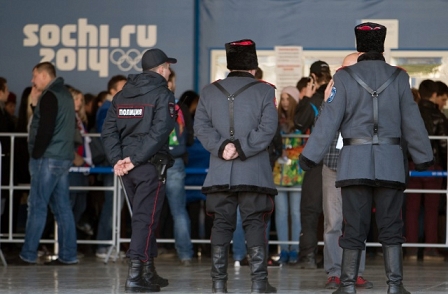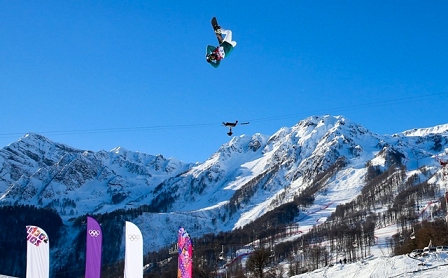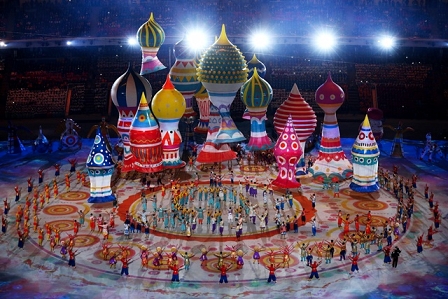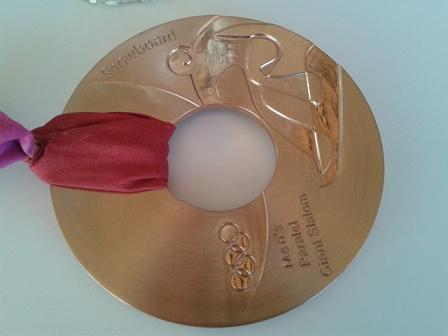Erstellt am: 8. 2. 2014 - 16:03 Uhr
"Mean-Spirited" Coverage Of Sochi?
“The athletes and spectators that we have spoken to all say that Sochi is now the safest place on the planet,” says Anya Ardayeva, Reality Check’s correspondent in the Olympic host city on the Black Sea.
After announcing that he was placing “a Ring of Steel” around the Games, Russian President Vladimir Putin has ordered 40,000 police and security personnel to the watch over the venues. The Russian authorities say they will also use drones, anti-aircraft batteries and the country's Navy in a bid to prevent any kind of terrorist attack and Ardayeva says there are hidden cameras on most buildings.

APA/EPA/HANNIBAL HANSCHKE
Such extravagant (and expensive) measures were deemed necessary after two suicide bomb blasts in December in the Russian city of Volgograd, which is known as a hub for travelling south. The attacks, which killed dozens, were seen a pre-Games warning strike. Indeed, the main Caucasus insurgent leader Doku Umarov, while claiming responsibility for the attacks, explicitly threatened to blow up Sochi during the Games.
“On The Bones Of Many Muslims”
Umarov, who aims to create an “Islamic Caliphate in the Caucasus” and claims the Olympics are being held "on the bones of many Muslims". The Black Sea region was once home to the Muslim Circassians, who were defeated and then forced into exile after a Russian military campaign in 1864. Krasnaya Polyana, where tomorrow’s downhill will be held, is near a burial site for many of the Circassian victims of that bloody campaign.
The North Caucasus remains a very volatile area – the border to the breakaway Georgian republic of Abkhazia is close to the Olympic venues. The nearby Russian Caucasus republics of Dagestan, Chechnya and Ingushetia have all been troubled by Muslim insurgencies led by men like Umarov.
Intimidating Atmosphere?
So how is security being felt? Is it intimidating? Ardayeva told me about the long thorough checks getting into the Olympic venues: “they check you three or four times. Your ID is checked, your bags are checked.” But she says that the security forces are trying to be discreet: “Most of them aren’t wearing uniforms, but you can usually tell quite easily who is working for the security forces.”
Winter Olympics By The Beach
So it is apparently “safe” in Sochi and it is also warm with temperatures hovering around 13 degrees during the day over the past 48 hours. “It doesn’t feel like a Winter Olympic venue,” says Ardayeva. “There are palm trees everywhere, it is sunny every day and you can get to the beach within ten minutes.”
But there is plenty of snow 50km away in the mountains and, whatever you think of the massive costs of the Olympics and the human rights stories that have justifiably dominated the Western media coverage of Sochi in the run up to the Games, the footage of the early action from the venues has been spectacular.

APA/EPA/JENS BUETTNER
Despite some quibbles about the ferocious size of the kickers, the majority of athletes at the Rosa Khutor Extreme Park, where the snowboarding events are being held, have reported excellent conditions and facilities.
“Mean-Spirited Coverage”
So are we being fair in our coverage of the Olympics? “When the Western journalists started tweeting pictures of hotel rooms that weren’t ready and bathrooms that weren’t fully constructed, there was a sort of joy in seeing the Russians fail that seemed to get a bit too much traction,” says our Russian correspondent Charles Maynes. “I think it is justified to talk about the problems and it is certainly justified to highlight the human rights issues, but some of the coverage did seem a bit mean-spirited.”
“Breaking Stereotypes”
Then how, with an open mind, do we judge the bombastic Opening Ceremony last night? The head of the organising committee, Dmitry Chernyshenko, said Sochi would "break stereotypes, and show a new Russia to the world." There were a few hitches, such as the naughty 5th snowflake that stubbornly refused to unfurl itself into an Olympic ring but much of the show, which included what appeared to be ballet-dancing jellyfish, was by most accounts, a lot of fun. Putin, it seems, is not a fan of camp, but what are we to make of the Russian policemen who kicked off events by singing Daft Punk's "Get Lucky"? Here they are rehearsing:
The centre piece was a cartoon version of Russian history full of bouncy-castles with onion-domes, (for some reason) a giant inflatable pig, and happy Soviet workers erecting skyscrapers. It was hectic, and actually rather fun: “Russia has a rather schizophrenic history and has struggled to connect together all these different chapters from the Tsarist times to the Soviet-era to this post-Soviet era,” says Maynes. “What we saw last night was essentially history colliding in itself.”

APA/EPA/TATYANA ZENKOVICH
“Verharmlosung?”
It was obviously a glossing over of Russian history, devoid of gulags and totalitarianism but that is hardly surprising at an Olympic Ceremony: after all, the London Olympics didn’t focus too much on colonialism. In fact many British commentators suspected that director Konstantin Ernst had taken a lot of inspiration from London 2012’s director Danny Boyle.
Charles Maynes was interested in the lack of a mention of the Second World War – or The Great Patriotic War. Putin has used the war as a national unifying idea and so its absence from the history lesson was significant: “I think this really was an attempt to show a different side of Russia, but it is an open question if the image the organisers were trying to project really does reflect the reality of Russia under Putin. I don’t really think it does.”
“Pseudo-Lesbians and Rainbow Tracksuits”
Watching on television I had my eyes peeled and ears pricked for any reference to the highly criticised Russian “anti-gay laws” which have caused so much controversy in the run up to the games. There was the school-uniform wearing, hand-holding performance by early 21st century duo t.A.T.u, a group described on Wikipedia as “pseudo-lesbian”, there was the entrance of the German team wearing what appeared to be rainbow-coloured tracksuits and there were cheers for IOC President Thomas Bach when he said Olympics were to be held "with tolerance and without any form of discrimination for whatever reason." Was that a rebuke to Putin? “I think everyone knew what he was talking about,” says Maynes.
Dreams Fulfilled, Dreams Lost
There has been much cynicism in the run-up to Games – and justifiably so. If a political leader wants to use a sporting event to promote his own image, it is certainly not the obligation of the world’s media to play to the script and to applaud.
But now it is perhaps time to hands over the centre stage to the athletes who had no choice in the venue have worked so hard and often sacrificed so much to get to the Games.
There remains something magic about the Olympics. I'm a sports fan. When Russian hockey great Vladislav Tretiak and three-time gold medallist Irina Rodnina joined hands to light the Olympic cauldron, I couldn’t help the frisson of excitement running down by spine.
Dreams held since earliest childhood will be destroyed or fulfilled during the next two weeks.
“This doesn’t take away from the many issues that we have been talking about such as human rights, the environment and gay rights,” says Charles Maynes, “those issues will remain in the background of these Games. But it is a time to take at least a moment and celebrate these athletes as well."
A FM4 Reality Check Special On Sochi
Dieses Element ist nicht mehr verfügbar



